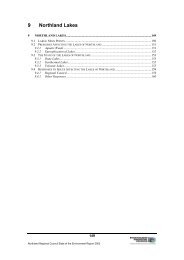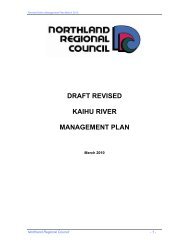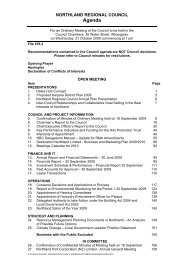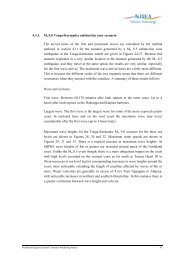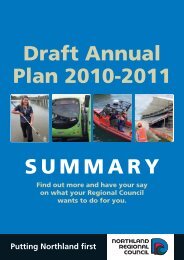Northland Civil Defence Emergency Management Plan, 2010
Northland Civil Defence Emergency Management Plan, 2010
Northland Civil Defence Emergency Management Plan, 2010
- No tags were found...
Create successful ePaper yourself
Turn your PDF publications into a flip-book with our unique Google optimized e-Paper software.
8 MANAGEMENT AND GOVERNANCEThis section describes the management and governance arrangements for theprovision of CDEM in <strong>Northland</strong>. This includes how CDEM will be delivered and theroles and responsibilities of CDEMG, CEG members and the Group <strong>Emergency</strong><strong>Management</strong> Office. Key appointments and funding arrangements are alsodescribed.8.1 MEMBERS OF THE CDEM GROUP8.1.1 STRUCTURE AND MEMBERSThe structure of the CDEM group is illustrated in figure 20. The <strong>Northland</strong> CDEM Group was constituted in March2002 under section 12 of the CDEM Act, as a Joint Standing Committee. This Committee comprises the Mayor orChairperson (or their delegated representative) of the Group’s three local authorities and regional council. Eachmember also appoints an alternate representative to act in the absence of the appointed representative. Allrepresentatives have authority to vote and make decisions for their respective organisation without having to seekfurther approval.The NZ Fire Service and NZ Police are represented by the District Commander’s on the Joint Standing Committee inan observer capacity.8.1.2 MEETING ARRANGEMENTSThe CDEM Group meetings are held:No less than quarterly, generally in the months of March, June, September and December.In publicIn accordance with the New Zealand Standard for model standing orders (NZS 9202:2001) or any New ZealandStandard substituted for that standard.With a quorum of no less than four members, with each member having only one vote.The CDEM Group elects its own chairperson and deputy Chairperson to hold office for three years or untilreplaced.8.1.3 POWERS, OBLIGATIONS AND FUNCTIONSThe powers and obligations of members of the CDEM Group are covered in section 16 of the Act (2002). TheGroup has all the powers that are reasonably necessary advantageous to enable it to perform its functions,including the power to delegate any of its functions to members, the Group Controller, or any other person.Section 16 Powers and Obligations of members of the <strong>Civil</strong> <strong>Defence</strong> <strong>Emergency</strong> <strong>Management</strong> GroupsEach member of a <strong>Civil</strong> <strong>Defence</strong> <strong>Emergency</strong> Manage Groupsa)may acquire, hold, and dispose of real or personal property for the use of the Group; andb) may renumerate its representative for the cost of that person’s participation in the Group; andc) must provide to the Group the information or reports that may be required by the Group; andd) must pay the costs of administrative and related services in accordance with section 24;e) must pay the costs, or a share of the costs, of any CDEM activity that the member has agreed to pay;andf) may carry out any other functions or duties conferred on a member of a Group under this Act.<strong>Civil</strong> <strong>Defence</strong> and <strong>Emergency</strong> Act (2002)<strong>Northland</strong> <strong>Civil</strong> <strong>Defence</strong> <strong>Emergency</strong> <strong>Management</strong> <strong>Plan</strong>, <strong>2010</strong>-2015 Page 62



